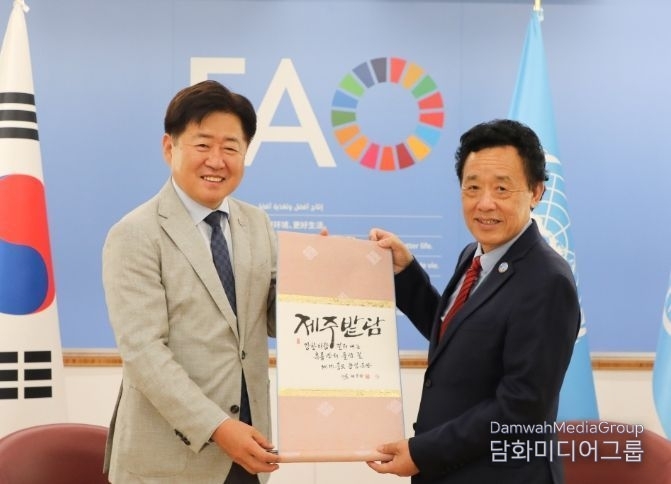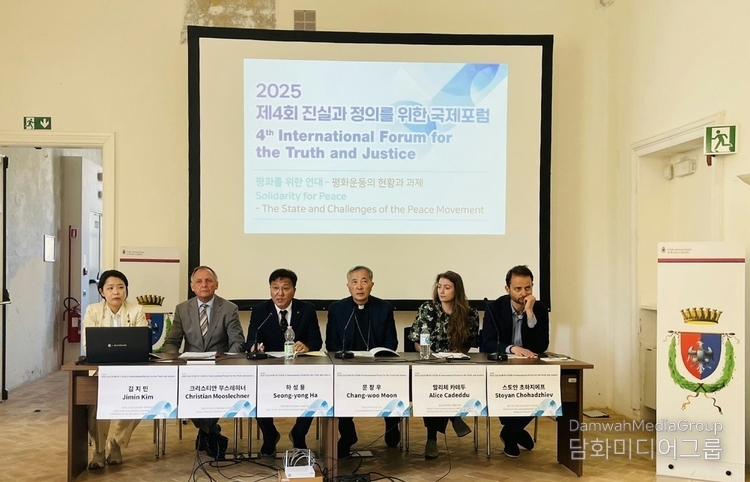By Diplomacy Journal Kayla Lee
Governor Oh Young-hoon of Jeju Special Self-Governing Province met with Director-General Qu Dongyu at the UN Food and Agriculture Organization (FAO) headquarters in Rome, Italy, to discuss international cooperation on Jeju's globally important agricultural heritage system on June 25, 2025.
Qu Dongyu is from Hunan Province, China, and holds a PhD in Agricultural and Environmental Sciences from Wageningen University in the Netherlands. He has served as Director-General of the FAO since August 2019.

The main agenda of the meeting was the sustainable preservation and utilization of Jeju's field wall agriculture system and Jeju's female divers' fishing system, both of which are recognized as Globally Important Agricultural Heritage Systems.
In particular, as the certificate award ceremony for the Jeju Haenyeo (female diver) Fishing System, which was certified in 2023, will be held at the FAO headquarters in Rome on October 31, specific preparations for the ceremony were also discussed.
Governor Oh Young-hoon expressed his gratitude to the officials at the FAO headquarters who are preparing for the award ceremony for the Jeju Haenyeo Fishing System and said, “I hope this award ceremony will be a great opportunity to promote Jeju's unique agricultural heritage to the world.”
He emphasized that Jeju agriculture is a core industry accounting for 10% of Jeju's gross regional domestic product (GRDP), saying, “Jeju has grown into an agricultural hub producing 70% of the nation's winter vegetables thanks to its climate conditions optimized for winter vegetable cultivation.”

He also shared Jeju's international agricultural cooperation achievements, including the seed potato distribution project in Namibia, Africa. Governor Oh said, “The seed potatoes developed in Jeju have been proven to be successfully cultivated in Namibia,” and added, “We expect Jeju potato cultivation to spread throughout Namibia in the future.”
He also said, “Jeju Island will actively cooperate with the food security policies and climate crisis response measures promoted by the Food and Agriculture Organization of the United Nations,” adding, “We will do our best to contribute to solving global food issues at the local government level.”
Secretary-General Qu Dongyu said, “Traditional agricultural systems contain a great deal of wisdom that modern agriculture can learn from, and the FAO considers the preservation and promotion of the Global Important Agricultural Heritage Systems to be very important.” He added, “Through the Jeju Haenyeo Fishing System certification ceremony in October, we will spread the value of Jeju’s haenyeo culture throughout the world.”
He also expressed his willingness to cooperate, saying, “The Food and Agriculture Organization of the United Nations has maintained a close cooperative relationship with South Korea for decades, and we hope to further strengthen our direct cooperation not only with the central government of South Korea but also with local governments such as Jeju Island.”
The two sides also discussed a special project to commemorate the 80th anniversary of the Food and Agriculture Organization of the United Nations. They agreed to install a statue of a Haenyeo (female diver) at the FAO headquarters and produce a promotional video on the theme of “International Food Heroes: Jeju Female Divers' Fishing System.”
This has symbolic significance in that it officially recognizes and promotes the global value of Jeju's female diver culture at the FAO level. It is also expected to highlight the implications of the female divers' sustainable traditional fishing methods for global food security and marine ecosystem conservation.
Jeju Province plans to strengthen cooperation with the FAO to establish Jeju's agricultural and fisheries heritage as a global model for sustainable agricultural and fisheries development, rather than merely as a tourist resource.
Along with this, the Jeju delegation held the “4th Jeju 4·3 International Forum for Truth and Justice” at the Villa Altieri Museum in Rome.







